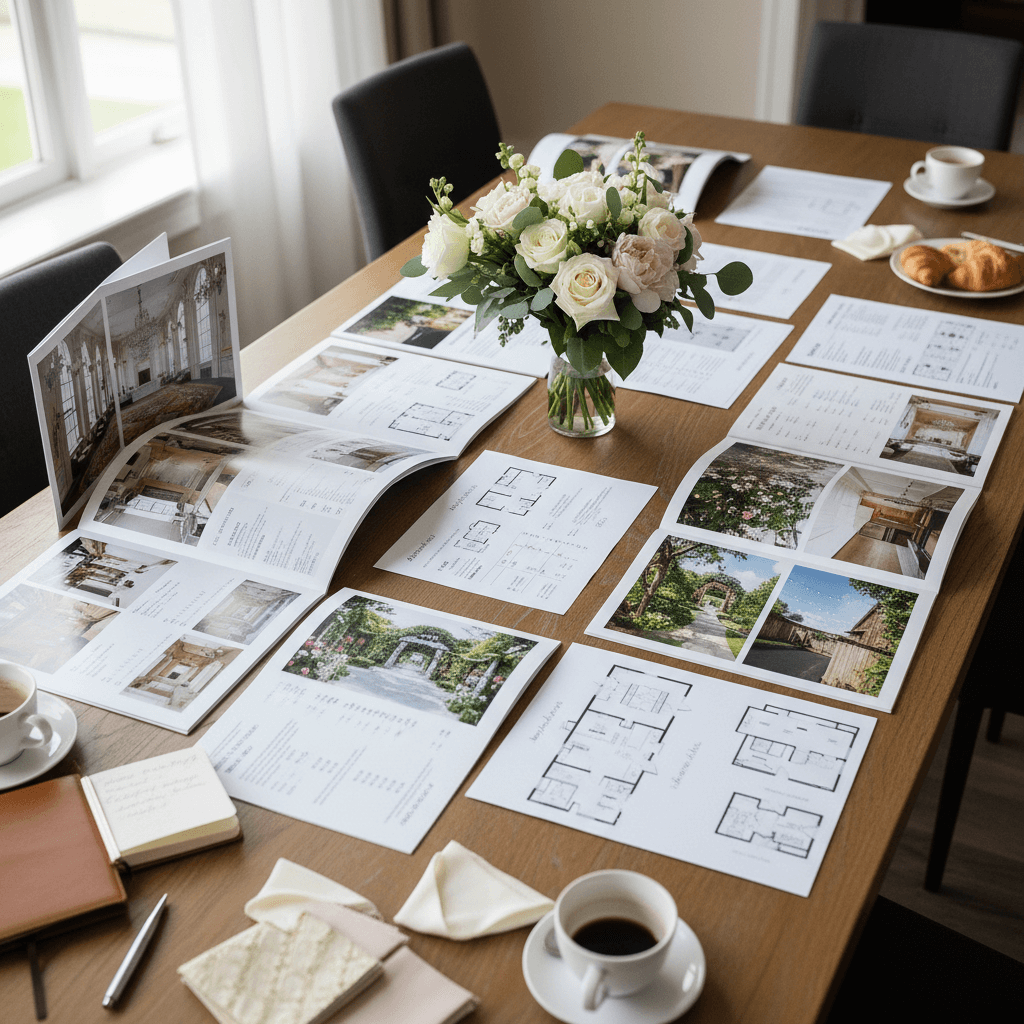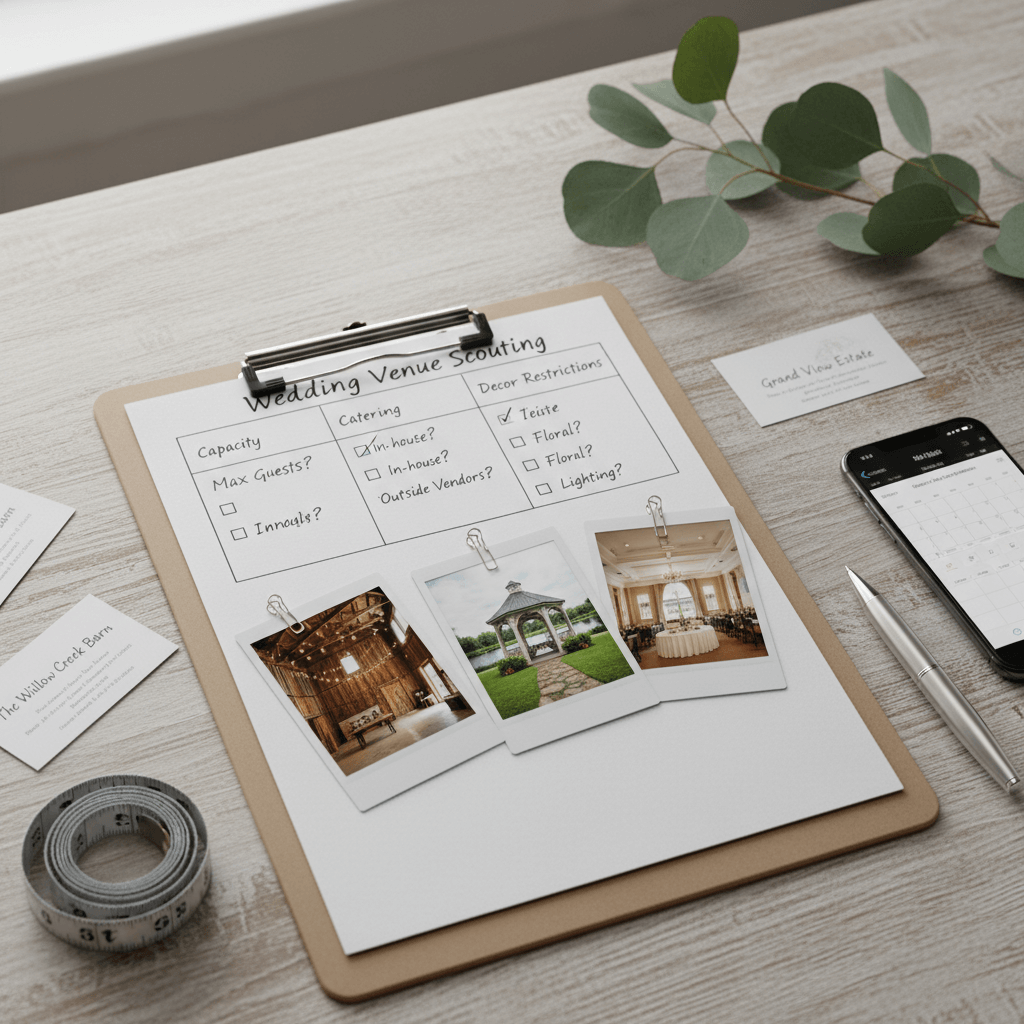Find Wedding Venues
Discover Your Perfect Wedding Venue
Finding the perfect wedding venue represents one of the most critical and exciting decisions in your wedding planning journey. Your venue choice affects every other aspect of your celebration, from guest capacity and catering options to decor requirements and photography opportunities. The right venue not only accommodates your practical needs but also reflects your personality as a couple while creating the perfect backdrop for your love story.
Modern venue selection involves much more than simply finding a beautiful location – it requires understanding complex factors including pricing structures, service inclusions, vendor restrictions, and seasonal availability that can significantly impact your overall wedding experience and budget. The most successful couples approach venue selection with clear priorities and thorough research that ensures their choice supports all their celebration objectives.
Today's wedding venue landscape offers unprecedented variety, from traditional ballrooms and country clubs to unique spaces like museums, wineries, barns, and destination locations. This abundance of options provides couples with opportunities to create truly personalized celebrations while requiring more sophisticated evaluation processes to identify venues that truly match their needs and vision.
Venue Types and Style Considerations
Traditional wedding venues including hotels, country clubs, and banquet halls offer comprehensive service packages that simplify planning while providing predictable quality and professional coordination. These venues typically include experienced event coordination, established vendor relationships, and backup systems that reduce planning stress while ensuring reliable service delivery on your wedding day.
Unique and alternative venues such as museums, art galleries, historic buildings, and outdoor locations provide distinctive backdrops that create memorable experiences while often requiring more complex planning and coordination. These venues may offer greater creative freedom and lower base costs but typically require additional vendor coordination, equipment rental, and permit management.
Destination wedding venues expand your options globally while creating vacation experiences for your guests and yourselves. These locations require careful consideration of travel logistics, legal requirements, cultural considerations, and guest accommodation needs while offering opportunities for intimate celebrations in spectacular settings that become lasting memories for all participants.
Professional Venue Search
Discover amazing wedding venues with advanced search and comparison tools at planning.wedding/search/venues – designed to help you find the perfect location for your celebration.
Wedding Venue Examples
Explore these professional wedding venue search and management tools to inspire your own location discovery process. Each example demonstrates different approaches to venue research, comparison, and booking coordination.

Digital Venue Search

Venue Booking Calendar

Venue Comparison Tools

Contract Management

Venue Inspiration Board

Venue Evaluation Checklist
Budget and Pricing Structure Analysis
Venue pricing structures vary significantly and often include complex fee arrangements that go beyond simple rental costs. Understanding all-inclusive packages versus à la carte pricing helps couples make accurate budget comparisons while identifying potential hidden costs that could affect overall wedding expenses. Many venues require additional fees for services, equipment, overtime, or special arrangements that should be factored into total cost calculations.
Peak season and date pricing affects venue costs significantly, with weekend dates during popular wedding months commanding premium pricing while off-season and weekday celebrations often provide substantial savings. Understanding seasonal pricing patterns and flexibility with date selection can create opportunities for significant budget optimization without compromising venue quality or service standards.
Service inclusion analysis helps couples understand what venue fees include versus additional services that require separate coordination and payment. Some venues provide comprehensive service packages including catering, coordination, and equipment, while others focus primarily on space rental and require couples to coordinate all additional services independently.
Capacity and Layout Optimization
Venue capacity considerations must account for different celebration phases including ceremony seating, cocktail hour mingling, and reception dining configurations. Understanding how spaces adapt for different activities ensures that your venue can accommodate your guest list comfortably throughout your entire celebration timeline without feeling overcrowded or sparse during any phase.
Layout flexibility affects both guest experience and vendor service delivery, with some venues offering multiple configuration options while others provide limited arrangement possibilities. Understanding space limitations and opportunities helps couples optimize their celebration flow while ensuring that all planned activities can be accommodated appropriately within available space constraints.
Accessibility considerations ensure that all guests can participate fully in your celebration regardless of mobility limitations or special needs. Venue accessibility includes not just wheelchair access but also considerations for elderly guests, guests with hearing impairments, and families with young children who may need special accommodations or facilities.
Vendor Policies and Service Integration
Venue vendor policies significantly affect your planning flexibility and potential costs, with some locations maintaining preferred vendor lists while others allow complete vendor choice freedom. Understanding vendor restrictions, required insurance policies, and setup limitations helps couples make informed decisions about venue selection while anticipating additional coordination requirements.
Catering policies vary from venues with exclusive in-house catering to locations that allow outside caterer selection with specific requirements or restrictions. These policies affect both menu options and pricing while influencing overall service coordination and quality control. Understanding catering arrangements early in venue selection prevents later disappointments or unexpected costs.
Setup and breakdown policies affect vendor coordination and timeline planning, with some venues providing extensive setup support while others require couples to coordinate all arrangement activities independently. Understanding these policies helps couples plan appropriate vendor coordination and timeline allocation for setup and breakdown activities.
Location and Logistics Considerations
Geographic location affects guest convenience, travel costs, and accommodation needs while influencing overall celebration accessibility and participation rates. Central locations with good transportation access typically support higher attendance rates while remote locations may create travel challenges that affect guest participation despite their unique appeal and beauty.
Parking and transportation considerations affect guest experience significantly, especially for venues in urban areas or remote locations where parking might be limited or transportation coordination complex. Understanding parking availability, valet services, and public transportation access helps couples provide appropriate guidance and support for guest arrival and departure.
Weather contingency planning becomes crucial for venues with outdoor elements, requiring understanding of backup options, seasonal weather patterns, and equipment needs for different weather conditions. Effective weather planning ensures that your celebration can proceed successfully regardless of weather conditions without compromising guest comfort or celebration quality.
Technology and Modern Amenities
Audio-visual capabilities affect ceremony and reception programming, from sound system quality for vows and speeches to lighting options that enhance photography and celebration atmosphere. Understanding technology inclusions and limitations helps couples plan appropriate equipment needs while ensuring that all celebration elements can be executed effectively.
Internet connectivity and mobile service quality affect both vendor coordination and guest experience, especially important for venues in remote locations where connectivity might be limited. Professional photographers, videographers, and live streaming services require reliable internet access for optimal service delivery.
Power and electrical capacity considerations affect vendor equipment needs, lighting arrangements, and entertainment options while ensuring that all technical requirements can be met safely and effectively. Understanding venue electrical capabilities prevents technical problems that could affect service delivery or celebration programming.
Complete Venue Resources
Access comprehensive venue search tools and expert selection guidance at planning.wedding – everything you need to find and secure your perfect wedding venue.
Contract Negotiation and Booking Strategy
Venue contract negotiation requires understanding industry standards, seasonal availability patterns, and negotiable terms that could affect both service quality and costs. Professional negotiation approaches focus on mutual benefit while ensuring that contract terms protect couple interests and provide appropriate service guarantees.
Booking timing strategies balance venue availability with planning timeline needs, recognizing that popular venues often require booking 12-18 months in advance while unique or flexible venues might accommodate shorter planning timelines. Understanding optimal booking timing helps couples secure preferred venues while maintaining realistic planning schedules.
Cancellation and modification policies provide important protection for couples while affecting venue selection decisions, especially during uncertain times when celebration plans might need adjustment. Understanding policy implications helps couples make informed venue commitments while maintaining appropriate flexibility for changing circumstances.
Venue Visit and Evaluation Process
Professional venue evaluation involves systematic assessment of all factors affecting venue suitability, from practical considerations like capacity and amenities to subjective elements like atmosphere and aesthetic appeal. Structured evaluation processes help couples make objective comparisons while ensuring that all important factors receive appropriate consideration.
Question preparation for venue visits ensures that all important information is collected while maximizing the value of site visit time. Professional question lists cover practical, financial, and service aspects while addressing specific concerns related to couple priorities and celebration requirements.
Documentation and comparison systems help couples organize venue information and make informed final decisions based on comprehensive evaluation rather than emotional impressions alone. These systems support confident venue selection while ensuring that all important factors are properly weighted in final decision-making processes.